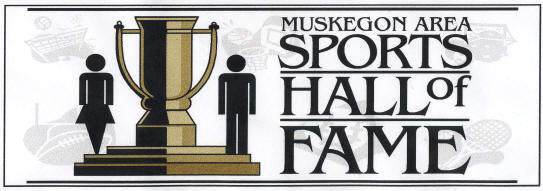Bennie Oosterbaan, a gridiron legend at the University of Michigan, was arguably the finest athlete produced by the Muskegon area. A three time football All-American at U of M from 1925-27, Bennie, along with Alabama’s Don Hutson, was selected by renowned sportswriter Grantland Rice in 1950 as one of the two ends on his all-time All-American team representing the first half of the century. A poll by Michigan Alumni and friends in 1979 selected Oosterbaan as U of M’s greatest all-time football player – high praise indeed to be so honored by a school with one of the nation’s greatest gridiron traditions. In 1949, the prestigious Coaches All-American Board placed Oosterbaan on their 25th anniversary team, representing the years from 1924-49.
His athletic career at Muskegon High School from 1921-23 was equally illustrious. He was an All-State end in 1922-23, as selected by the Detroit News, and in his junior year (1923) he led the Big Red basketball team to a state championship, resulting in High School All-American honors for himself.
At Michigan, Bennie had the good fortune of joining the varsity football team in Fielding H. Yost’s last two years as head coach (1925 & 1926). He also had the good fortune of teaming up with fellow All-American quarterback Benny Friedman and the passing combination Michigan vs Minnesota 1927of Benny-to-Bennie quickly became a Wolverine legend. In addition to his outstanding football career at Ann Arbor, Oosterbaan also received All-American recognition in basketball and was a star member of the Wolverine baseball squad.
After graduation, Bennie declined offers from professional football and remained on the U of M coaching staff as an assistant in football and basketball. In 1939 he became head coach of the basketball program and, when Fritz Crisler became athletic director in 1948, he was named Wolverine varsity gridiron coach. Oosterbaan’s first year at the helm gave Michigan a national collegiate football championship with an undefeated season and, for Bennie, coach of the year honors. He remained head football coach through the 1958 season and finished with a 63-33-4 record and three Big Ten championships.
The Other Oosterbaan
A shrine to his inspiration
The photograph sat silently on a table at the base of the stairs. A young man standing alone, dressed in his uniform. In his left hand, a football. Behind him are the old wooden bleachers of Muskegon High School’s Hackley field.
Above the table, a framed print hung on a basement wall. College Coach of the Year, 1948. These were keepsakes belonging to perhaps Muskegon’s finest athlete ever – Bennie Oosterbaan.
One might assume that the photograph of the young athlete was of Bennie from his playing days at Muskegon.
Rather, the young man was his brother, Andy.
Bennie was the third son of Muskegon’s postmaster, Benjamin Gaylord Oosterbaan, Sr. and his wife, Hattie Guy, the oldest, was 13 years his elder. Andy was in the middle – only four years older than Bennie.
A fine football and basketball player, Andy captained the Muskegon High School basketball team in his junior year. However, in the winter of 1919, Andy injured his knee while playing basketball and was forced from the lineup.
Infection followed Oosterbaan’s injury and he was rushed to the hospital by his family. After a four week battle for his life, he slipped away. A streptococcal bacteria infection had set in – easily treated with penicillin today. However, in the winter of 1919, very little could be done to save the young man’s life.
It was the second time in less than two years that death had visited the Oosterbaan household. In the fall of 1917, pulmonary tuberculosis took the life of Guy Oosterbaan at the age of 24.
As expected, the passing of the brothers was extremely hard on the Oosterbaan family. Andy’s death had made the Oosterbanns leery of allowing Bennie to participate in sports. Although reports noted that the injury could have occurred anywhere, Bennie’s mother blamed Andy’s participation in basketball.
Fearing another loss, she did not want her youngest son to compete in athletics. But after persistent coaxing, Bennie persuaded his parents to allow him to compete.
Imagine if he hadn’t succeeded.




